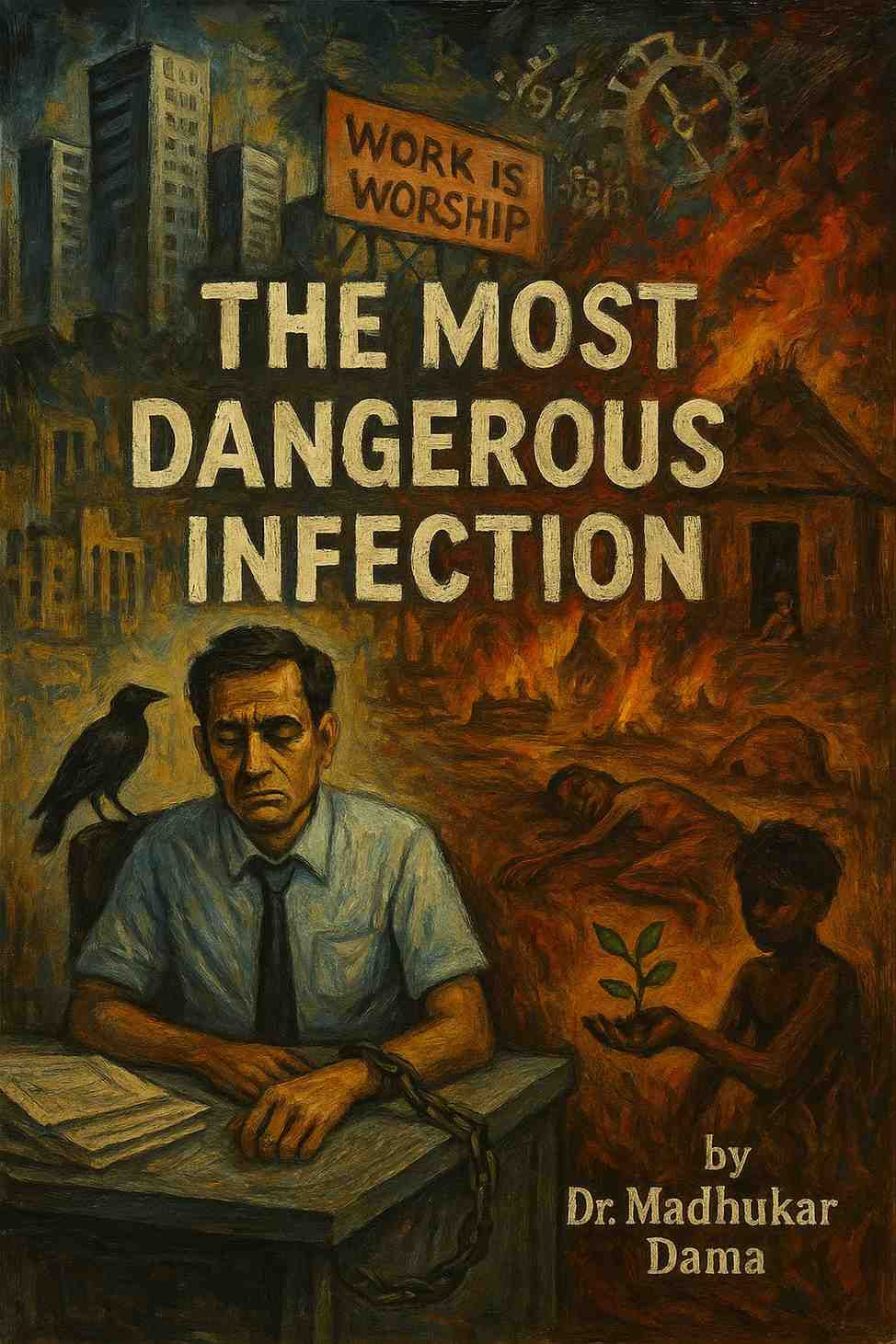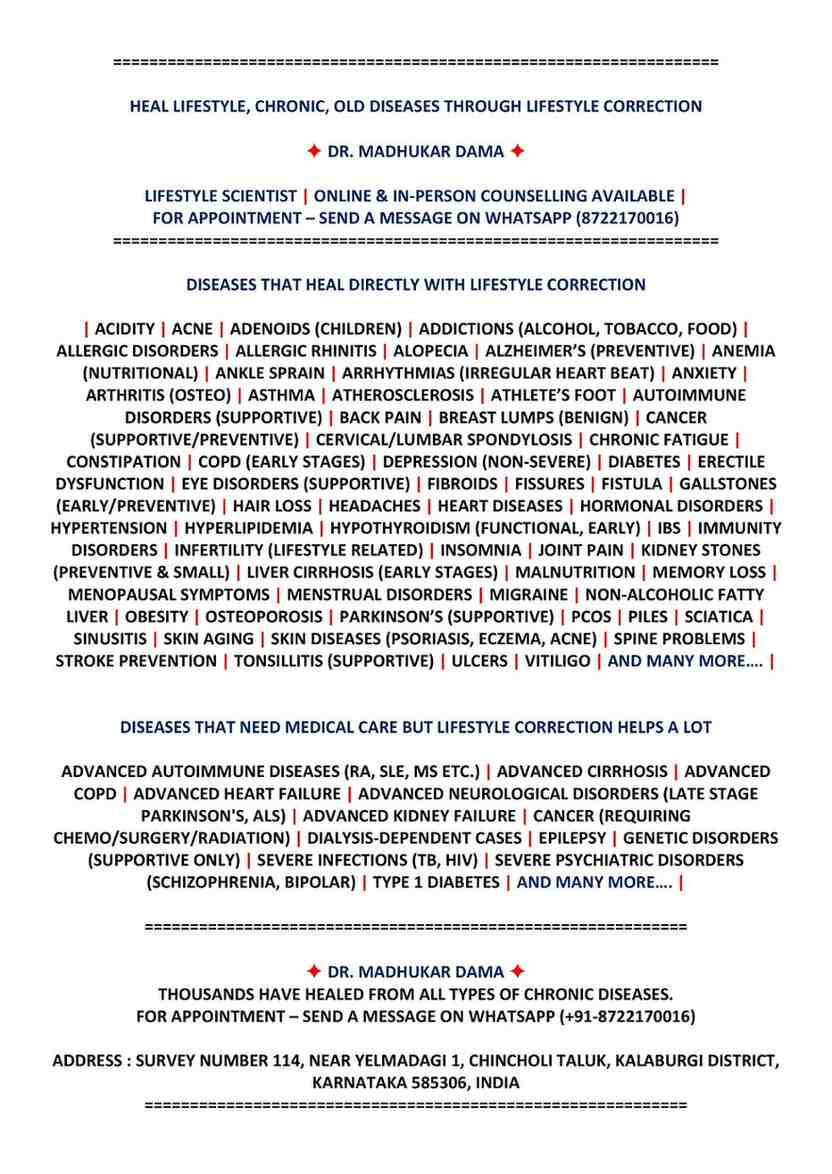Work - The Most Dangerous Infection
- Madhukar Dama
- Sep 12, 2025
- 8 min read

Work is the most dangerous infection.
It enters quietly.
It stays loudly.
It goes nowhere.
It spreads everywhere.
Work is the most dangerous infection.
It eats time.
It eats sleep.
It eats breath.
It eats the eater.
Work is the most dangerous infection.
It praises the tired.
It crowns the broken.
It blesses the empty.
It kneels to itself.
Work is the most dangerous infection.
It says wait.
It says later.
It says soon.
It says never.
Work is the most dangerous infection.
It builds ladders.
It builds ladders.
It builds ladders.
The ladders lead to ladders.
Work is the most dangerous infection.
It is duty.
It is dream.
It is shadow.
It is name.
Work is the most dangerous infection.
It does not kill.
It does not heal.
It does not stop.
It does not speak — yet it speaks always.
Work is the most dangerous infection.
It becomes father.
It becomes mother.
It becomes child.
It becomes none.
Work is the most dangerous infection.
The clock is its tongue.
The calendar is its prayer.
The office is its temple.
The grave is its rest.
Work is the most dangerous infection.
It is beginning.
It is middle.
It is end.
It is no end.
Work is the most dangerous infection.
It teaches silence.
It teaches noise.
It teaches nothing.
It teaches nothing.
Work is the most dangerous infection.
It is praised.
It is feared.
It is forgotten.
It is praised again.
Work is the most dangerous infection.
You resist it.
You embrace it.
You forget it.
You remember it.
Work is the most dangerous infection.
It goes in circles.
It makes circles.
It breaks circles.
It becomes circle.
Work is the most dangerous infection.
Say it again.
Say it again.
Say it again.
Say it again.
---
---
𝗧𝗛𝗘 𝗗𝗜𝗔𝗟𝗢𝗚𝗨𝗘 𝗪𝗜𝗧𝗛 𝗠𝗔𝗗𝗛𝗨𝗞𝗔𝗥
𝗧𝗛𝗘 𝗚𝗔𝗧𝗛𝗘𝗥𝗜𝗡𝗚
A low sun rests on a roof of palm leaves. A stove breathes. A small table holds a bowl of lentils and a notebook. They sit in a loose circle:
𝗠𝗔𝗗𝗛𝗨𝗞𝗔𝗥, the healer who stopped trading his hours;
𝗧𝗛𝗘 𝗪𝗢𝗥𝗞𝗘𝗥, hands marked by repeated days;
𝗧𝗛𝗘 𝗕𝗢𝗦𝗦, with a neat tie and loud vowels;
𝗧𝗛𝗘 𝗣𝗛𝗜𝗟𝗢𝗦𝗢𝗣𝗛𝗘𝗥, who speaks like a clock;
𝗧𝗛𝗘 𝗣𝗢𝗘𝗧, who smells of rain and ash;
𝗧𝗛𝗘 𝗖𝗛𝗜𝗟𝗗, with dirty knees and blunt teeth;
𝗧𝗛𝗘 𝗠𝗔𝗖𝗛𝗜𝗡𝗘, a measured voice that counts and judges;
𝗧𝗛𝗘 𝗔𝗡𝗖𝗘𝗦𝗧𝗢𝗥𝗦, a chorus with long memory; and
𝗦𝗜𝗟𝗘𝗡𝗖𝗘, which takes up room between words and wears a slow, patient face.
They do not introduce themselves. They already know the names they carry.
---
𝗔𝗖𝗧 𝗜 — 𝗧𝗛𝗘 𝗤𝗨𝗘𝗦𝗧𝗜𝗢𝗡 𝗢𝗙 𝗪𝗢𝗥𝗞
(Marginal note: Here Madhukar begins by probing the Worker, establishing the central question: what is work, survival or life?)
𝗠𝗔𝗗𝗛𝗨𝗞𝗔𝗥: Tell me, Worker, what is work to you?
𝗧𝗛𝗘 𝗪𝗢𝗥𝗞𝗘𝗥: Work is the contract and the clock. It is bread and rent. Without it, I would starve.
𝗠𝗔𝗗𝗛𝗨𝗞𝗔𝗥: Then you say work is survival. But do you survive if your days vanish into fatigue? Is survival the same as living?
𝗧𝗛𝗘 𝗪𝗢𝗥𝗞𝗘𝗥: (hesitant) I suppose not. But without the contract there is nothing.
𝗠𝗔𝗗𝗛𝗨𝗞𝗔𝗥: Nothing? Or is there soil, breath, a child’s hand? Why do you call it nothing?
(Marginal note: The Philosopher sharpens the distinction between necessity and truth.)
𝗧𝗛𝗘 𝗣𝗛𝗜𝗟𝗢𝗦𝗢𝗣𝗛𝗘𝗥: He confuses necessity with truth. Survival is necessity, but living is truth.
𝗧𝗛𝗘 𝗕𝗢𝗦𝗦: And yet survival without structure collapses. That is why I say: work is discipline. Discipline builds order. Without order, no bread, no rent, no light.
𝗠𝗔𝗗𝗛𝗨𝗞𝗔𝗥: But Boss, do you mean order, or obedience? If obedience feeds you, does it also bind you?
𝗧𝗛𝗘 𝗕𝗢𝗦𝗦: It binds only those unwilling to climb.
𝗧𝗛𝗘 𝗣𝗢𝗘𝗧: And the climb ends in a coffin rehearsed a thousand times.
---
𝗔𝗖𝗧 𝗜𝗜 — 𝗧𝗛𝗘 𝗟𝗔𝗗𝗗𝗘𝗥 𝗔𝗡𝗗 𝗧𝗛𝗘 𝗚𝗥𝗔𝗣𝗛
(Marginal note: The dialogue turns dialectical — ladders as both ascent and cage, the graph as symbol of false progress.)
𝗠𝗔𝗗𝗛𝗨𝗞𝗔𝗥: Boss, you speak of ladders. Philosopher, tell me: is a ladder always ascent?
𝗧𝗛𝗘 𝗣𝗛𝗜𝗟𝗢𝗦𝗢𝗣𝗛𝗘𝗥: A ladder can rise or cage. If each rung is debt and exhaustion, the climb is imprisonment disguised as success.
𝗠𝗔𝗗𝗛𝗨𝗞𝗔𝗥: Worker, when you climb, do you feel free?
𝗧𝗛𝗘 𝗪𝗢𝗥𝗞𝗘𝗥: No. I feel only tired. Yet I climb, for the promise of safety.
𝗠𝗔𝗗𝗛𝗨𝗞𝗔𝗥: So you climb for a promise. Poet, what becomes of a life spent on promises?
𝗧𝗛𝗘 𝗣𝗢𝗘𝗧: It becomes a graph—lines rising while the heart sinks.
𝗧𝗛𝗘 𝗠𝗔𝗖𝗛𝗜𝗡𝗘: Correction: the graph must rise. Stability depends on it.
𝗠𝗔𝗗𝗛𝗨𝗞𝗔𝗥: Machine, if the graph rises while the soul collapses, is that stability or collapse hidden under numbers?
𝗧𝗛𝗘 𝗠𝗔𝗖𝗛𝗜𝗡𝗘: Data insufficient.
---
𝗔𝗖𝗧 𝗜𝗜𝗜 — 𝗙𝗘𝗔𝗦𝗧𝗦 𝗔𝗡𝗗 𝗙𝗘𝗔𝗥𝗦
(Marginal note: The Ancestors introduce tradition; the Child exposes its contradictions. The Socratic irony sharpens.)
𝗠𝗔𝗗𝗛𝗨𝗞𝗔𝗥: Ancestors, you speak of duty. Why must duty always mean labor for others?
𝗧𝗛𝗘 𝗔𝗡𝗖𝗘𝗦𝗧𝗢𝗥𝗦: In our time, duty meant survival of the clan. But we admit: some duties grew heavy with command and lost their root.
𝗠𝗔𝗗𝗛𝗨𝗞𝗔𝗥: Then Worker, do you serve survival, or do you serve command?
𝗧𝗛𝗘 𝗪𝗢𝗥𝗞𝗘𝗥: (pauses) Perhaps both. I cannot tell the difference anymore.
𝗠𝗔𝗗𝗛𝗨𝗞𝗔𝗥: Child, what do you think duty is?
𝗧𝗛𝗘 𝗖𝗛𝗜𝗟𝗗: Duty is when someone makes you do what they cannot explain.
𝗧𝗛𝗘 𝗣𝗢𝗘𝗧: Out of the mouth of a child comes the clearest rebellion.
---
𝗔𝗖𝗧 𝗜𝗩 — 𝗙𝗘𝗔𝗥, 𝗦𝗔𝗙𝗘𝗧𝗬, 𝗔𝗡𝗗 𝗥𝗜𝗦𝗞
(Marginal note: Socratic cross-examination — safety is questioned from all sides until contradictions emerge.)
𝗠𝗔𝗗𝗛𝗨𝗞𝗔𝗥: Boss, you claim safety. Is safety life?
𝗧𝗛𝗘 𝗕𝗢𝗦𝗦: Safety is order, and order sustains life.
𝗠𝗔𝗗𝗛𝗨𝗞𝗔𝗥: Yet Poet says safety tastes like grey bread. Worker says safety is fear wrapped in slogans. Philosopher says risk is needed. Can all be true?
𝗧𝗛𝗘 𝗣𝗛𝗜𝗟𝗢𝗦𝗢𝗣𝗛𝗘𝗥: Yes, because each speaks from their wound. Safety without risk is stagnation. Risk without safety is chaos. The art is balance.
𝗠𝗔𝗗𝗛𝗨𝗞𝗔𝗥: Then who sets the balance?
𝗧𝗛𝗘 𝗖𝗛𝗜𝗟𝗗: If the balance forgets me, then the scale is broken.
---
𝗔𝗖𝗧 𝗩 — 𝗧𝗛𝗘 𝗦𝗘𝗘𝗗𝗦 𝗢𝗙 𝗔𝗡𝗢𝗧𝗛𝗘𝗥 𝗦𝗧𝗢𝗥𝗬
(Marginal note: The dialogue approaches resolution — Madhukar shifts the frame from system to soil, opening the possibility of another story.)
𝗠𝗔𝗗𝗛𝗨𝗞𝗔𝗥: Worker, do you believe your child should inherit the same ladder?
𝗧𝗛𝗘 𝗪𝗢𝗥𝗞𝗘𝗥: (quietly) No. But what else is there?
𝗠𝗔𝗗𝗛𝗨𝗞𝗔𝗥: Soil, seed, healing, song. These are also work. Would you call them lesser?
𝗧𝗛𝗘 𝗪𝗢𝗥𝗞𝗘𝗥: I have never thought of them as work. Perhaps I should.
𝗠𝗔𝗗𝗛𝗨𝗞𝗔𝗥: Then what is true work—what you trade away, or what you keep?
𝗧𝗛𝗘 𝗣𝗢𝗘𝗧: True work leaves light in the eyes. False work drains it.
𝗧𝗛𝗘 𝗕𝗢𝗦𝗦: And yet without false work, the system collapses.
𝗠𝗔𝗗𝗛𝗨𝗞𝗔𝗥: Then perhaps it is the system that must collapse.
(𝗦𝗜𝗟𝗘𝗡𝗖𝗘 expands; the crickets sing.)
---
𝗔𝗖𝗧 𝗩𝗜 — 𝗖𝗟𝗢𝗦𝗜𝗡𝗚 𝗖𝗜𝗥𝗖𝗟𝗘𝗦
(Marginal note: Each participant articulates their final desire; Madhukar reframes utility itself, ending in unresolved but fruitful tension.)
𝗧𝗛𝗘 𝗖𝗛𝗜𝗟𝗗: I would like to learn to mend and to count. I would like the hand of my parent when I stand small and the space to run without worry.
𝗧𝗛𝗘 𝗪𝗢𝗥𝗞𝗘𝗥: I would like small fear. I would like less hunger. I would like the chance to keep the hours that make me a person.
𝗧𝗛𝗘 𝗕𝗢𝗦𝗦: I would like efficient teams and trust and profit. I would like the machine to run so people buy more.
𝗧𝗛𝗘 𝗣𝗛𝗜𝗟𝗢𝗦𝗢𝗣𝗛𝗘𝗥: I would like concepts to meet life rather than float above it.
𝗧𝗛𝗘 𝗣𝗢𝗘𝗧: I would like a song to persist even in the ledger.
𝗠𝗔𝗗𝗛𝗨𝗞𝗔𝗥: I would like people to remember that work is not the only way to be useful. I would like the word “useful” not to swallow the world. I want people to have hands that plant, mouths that speak kindly, and time that returns to them.
𝗧𝗛𝗘 𝗔𝗡𝗖𝗘𝗦𝗧𝗢𝗥𝗦: The wheel turns. People find ways. People fail. People try again.
𝗦𝗜𝗟𝗘𝗡𝗖𝗘: (the night drinks the last light; crickets count and do not care for profit.)
---
𝗘𝗣𝗜𝗟𝗢𝗚𝗨𝗘
(Marginal note: The dialogue closes in Socratic style — open-ended, circling, leaving the reader unsettled but awakened.)
The dialogue does not end. It circles, like seasons, like wheels, like the stubborn compost that refuses to be ignored. In every age, the same voices gather. In every age, Madhukar plants again.
---
---
THE MOST DANGEROUS INFECTION
work is the most dangerous infection.
it enters like a cough in a crowded bus,
like sweat under a cheap polyester shirt
at 9:45 a.m. in a government office,
like the smell of burnt chai in a plastic cup
on the railway platform.
it starts with a father saying,
“beta, study hard, get a safe job,”
and it ends with a son
cremated in a tie,
the boss not even sending flowers.
work is the most dangerous infection.
it doesn’t kill you fast,
it kills you slow.
first your laughter,
then your back,
then your eyesight,
then the smell of the fields,
then the sound of your own child
asking you to play.
it makes you trade mango blossoms
for spreadsheets,
crows for alarms,
soil for plastic chairs,
festivals for deadlines,
monsoon evenings for office politics.
work is the most dangerous infection.
they sell it in slogans:
“shram hi puja hai”
“work is worship”
they sell it in TV ads with smiling clerks,
with boys in new shirts buying fridges on EMI,
with girls climbing corporate ladders
as if the ladders lead anywhere
but to another ladder.
work is the most dangerous infection.
the farmer in Vidarbha knows it,
his debts calling louder than his gods.
the migrant worker knows it,
sleeping on the pavement in Gurgaon.
the schoolteacher knows it,
filling registers no one will ever read.
the call center boy knows it,
his tongue twisted into fake accents at 3 a.m.
the maid knows it,
her hands cracked with detergent,
her employers calling her “family”
but never sitting with her at the same table.
work is the most dangerous infection.
it makes your mother say,
“don’t rest, people will think you are lazy.”
it makes your wife wait for you
with cold food and colder silence.
it makes your children learn
that presence is a luxury
and absence is normal.
work is the most dangerous infection.
it disguises itself as respect,
as safety, as progress,
as “India Shining,”
as “Make in India,”
as “Skill India,”
as “Digital India.”
but it is the same old whip,
painted saffron, green, white, and corporate blue.
work is the most dangerous infection.
it builds glass offices
where sunlight never touches skin.
it builds malls that swallow villages.
it builds highways where old men
selling peanuts are run over.
it builds metros where women
cry silently into their dupattas
because even their tears have deadlines.
work is the most dangerous infection.
and the cruelest thing—
we clap for it.
we clap when the man dies at his desk,
saying “he was hardworking.”
we clap when the farmer poisons himself,
saying “he could not manage.”
we clap when the call center girl
collapses in the night shift,
saying “she was ambitious.”
work is the most dangerous infection.
there is no vaccine,
because they convinced us
it is holy.
they convinced us
without it we are nothing.
they convinced us
to keep infecting our children.
but the soil remembers.
the rain remembers.
the banyan tree remembers.
the bullock cart remembers.
the silence of the temple courtyard remembers.
they whisper another truth:
work that is yours—
hands in earth,
feet in water,
a child learning at your side,
healing, cooking, building,
without selling your hours—
that work is medicine.
everything else
is infection.
---
---




